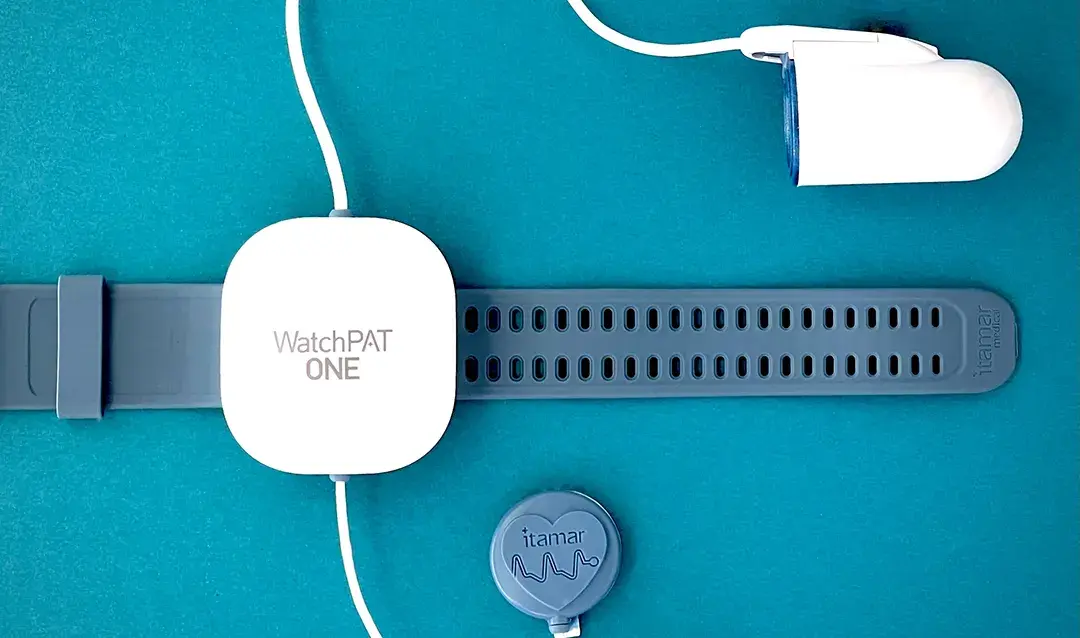How to Talk to Your Partner about Sleep Apnea
Step-by-step guidance to help your partner confront sleep apnea with confidence and love.

If your partner is experiencing symptoms of sleep apnea like persistent fatigue, snoring, or other troubling symptoms, you may be struggling with how to broach the topic.
Let's face it, discussing health matters isn't exactly a walk in the park—trust me, I'm in the thick of it all day long. It's such a tough nut to crack that most nursing and medical schools offer specialized training on delivering tough news to patients.
As someone’s partner, though, it's likely that you'll be the one having these conversations with your partner long before they ever speak to a medical provider. So, how can you go about these conversations in a way that helps them overcome hesitations and move forward?
I’m here to share everything I know about making these important health discussions a more positive and productive experience, starting with this critical nugget of wisdom.
The “Why” is more important than the “How”
As a Nurse Practitioner, a big part of my job is helping patients make meaningful changes in their lives. One evidence-based approach we often rely on in healthcare is known as 'Motivational Interviewing' (MI).1
Motivational Interviewing involves several core principles, which underpin the advice I'll be sharing here. But here's the key takeaway: change happens best when people find their own motivation for it. They need a crystallized 'why' to move them forward.
So, when it comes to discussing concerns with your partner—whether it's fatigue, anxiety, or other issues—simply listing reasons for them to address these issues may not be the most effective strategy. Instead, it's crucial to uncover their internal motivations. This means asking the right questions, making them feel safe to speak freely, and then genuinely listening to their responses. We'll break each of these steps down in detail below.
Practical Tips for Discussing Sleep Apnea with Your Partner
Here’s some things you’ll want to consider when talking to your partner about their symptoms:
1. Choose the Right Moment
Timing is everything. Bringing up sleep apnea right after your partner forgot to pick up your child from school due to fatigue? Definitely not ideal. Try to have these discussions when both of you are calm, relaxed, and can give each other your full attention.
2. Ask Open-Ended Questions
Instead of complaining about snoring or diving in with a diagnosis, start with open-ended questions like, "Do you often feel tired?" or "Have you been experiencing anxiety?" This approach will encourage a more meaningful conversation, allowing your partner to share their experiences without feeling judged.
3. Actively Listen and Reflect
Let your partner express themselves fully without interruptions. Listen attentively and reflect back what they're saying to show that you understand and validate their feelings. For example, "It sounds like your lack of sleep is impacting your work performance," or "Do you think your anxiety could be linked to your sleep patterns?"
4. Share What You Know About Sleep Apnea
Educate your partner about sleep apnea, its symptoms, and its potential impact on their health. Avoid jumping straight to diagnosis and instead focus on building awareness and understanding. You can mention how sleep apnea causes interruptions in breathing during sleep, leading to symptoms like exhaustion, brain fog, and anxiety.
If you want to educate yourself a bit more on sleep apnea to prepare yourself for the conversation, learn more here.
5. Ask what they think about getting screened for sleep apnea
Gently broach the topic of getting screened for sleep apnea by asking if they've ever considered it. Highlight the simplicity of the screening process and its potential benefits for their health. It might help to mention how easy it is to see their risk level for having sleep apnea with a simple screening.
Helping to Relieve Fears if They Test Positive
At Complete Sleep, a lot of our work has been focused on removing the huge issues historically associated with sleep apnea diagnosis and treatment. If your partner is scared from hearing horror stories about it, they have a right to be—the process used to be difficult and uncomfortable. It isn’t anymore.
However, despite that piece of encouragement, realize this can be an emotionally complex moment. It might be frustrating for a risk assessment to tell you that you likely have sleep apnea. On the flip side, your partner might also feel relieved that they finally have some answers for how they’re feeling. Here’s a few details that might help them feel better about what they’re going through:
You no longer have to go to a sleep lab to be officially diagnosed in most cases. Instead, new at-home sleep tests are incredibly accurate in detecting sleep apnea in the comfort of your own bed.
When most people think of sleep apnea, they fear the only treatment is an uncomfortable CPAP mask. But that’s just not true - easy-to-use oral appliances are rocketing in popularity.
Patients report 21.4% improvement in quality of life after treatment.2 What could your partner do if they felt 20% better?
Realize this is the beginning of a journey.
As you and your partner walk throughout the process of considering official diagnosis and therapy, realize that you’ll probably have to re-visit conversations like this several times.
However, ivory towers being what they are, things almost never happen the way you think they should in real life, and that’s usually ok. Humans are messy and take time to come around, and that is definitely ok.
How Your Partner's Sleep Affects Your Well-being
Here's a truth not often spoken about sleep apnea: it's not just your partner who bears the brunt of its effects. Anxiety, irritability, fatigue, and loud snoring aren't isolated to one person in a relationship—they affect both parties. Research confirms3 that these issues can have implications for your health as well. Motivational Interviewing focuses on your partner’s internal motivations for change, but that doesn’t mean ignoring your own feelings. During this process, it's important to communicate clearly with your partner about how their symptoms are affecting you as well. Change isn’t easy, but, in situations like this, the effort is worthwhile. If your partner is hearing about sleep apnea for the first time, allow them the space they need to digest this new information. In medicine, we rarely see a patient make significant changes after just one visit. But when we do, it’s usually because there’s a supportive partner in the background encouraging and guiding them along the journey to better health.
Rubak S, Sandbaek A, Lauritzen T, Christensen B. Motivational interviewing: a systematic review and meta-analysis. Br J Gen Pract. 2005 Apr;55(513):305-12. PMID: 15826439; PMCID: PMC1463134. Available from: https://www.ncbi.nlm.nih.gov/pmc/articles/PMC1463134/
Walia HK, Thompson NR, Katzan I, Foldvary-Schaefer N, Moul DE, Mehra R. Impact of Sleep-Disordered Breathing Treatment on Quality of Life Measures in a Large Clinic-Based Cohort. J Clin Sleep Med. 2017 Nov 15;13(11):1255-1263. doi: 10.5664/jcsm.6792. PMID: 28992832; PMCID: PMC5656474. Available from: https://pubmed.ncbi.nlm.nih.gov/28992832/
Luyster FS. Impact of Obstructive Sleep Apnea and Its Treatments on Partners: A Literature Review. J Clin Sleep Med. 2017 Mar 15;13(3):467-477. doi: 10.5664/jcsm.6504. PMID: 28095973; PMCID: PMC5337594. Available from: https://www.ncbi.nlm.nih.gov/pmc/articles/PMC5337594/




